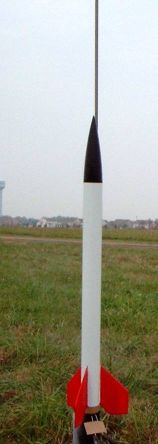| Construction Rating: | starstarstarstarstar_border |
| Flight Rating: | starstarstarstarstar_border |
| Overall Rating: | starstarstarstarstar_border |
| Diameter: | 0.76 inches |
| Length: | 12.20 inches |
| Manufacturer: | Semroc  |
| Skill Level: | 1 |
| Style: | Sport |
Brief:
Semroc has reintroduced the 1966 Centuri RDC kit in a slightly modernized and upgraded form. This is an entry level single stage minimum diameter 18mm kit, and at $5 list price, it could be a good kit for "build and fly" projects for scouts and school groups.
Construction:
Semroc uses very good quality components, packed in a plastic bag with unique production number tags in each kit. This kit includes:
- ST-790 body tube
- balsa nose cone/screw eye
- laser-cut fins
- crepe paper streamer
- elastic/Kevlar® shock cords
- 1/8" launch lug
Semroc instructions are well written and nicely illustrated. Veteran builders can whip this thing together in about half an hour without the instructions and novice builders will find plenty of good construction tips, like how to fill balsa grain, and a reminder to quickly pull out the motor casing used to push the motor block into the tube.
Construction starts by tying the Kevlar® line to the motor block, which is then glued inside the body tube. The Kevlar®/elastic shock cord combination is a great upgrade to the original design and is much more durable than the standard elastic and paper tri-fold mount.
The fins are laser cut (the sheet even has a cool Semroc logo burned into it). After lightly sanding rounded edges into them for better performance, they're ready for attachment. The alignment is a standard 3-fin 120 degree pattern, but for marking you're left with placing the tube on a circle/guide and marking the edge lines. I prefer a paper wrap/cutout but both approaches work.
The nose cone attachment is the classic screw eye into balsa method and is attached using the elastic shock cord.
The streamer is a basic crepe paper streamer attached to the shock cord using a small tape disk. I think this is probably the weakest point of the otherwise terrific kit and would suggest using a little more robust piece of masking tape, at least half an inch along the bottom of the streamer.
Finishing:
While the cover illustration in my kit showed a red/white roll pattern at the top end of the body, there are no decals included or referenced in the kit. Painting a roll pattern would definitely raise this above a skill level one kit.
I decided to go for a quick and easy tri-color scheme. After applying a couple of coats of white primer, I went with glossy white finish, masked off and painted the fins red, then painted the nose black. This matched the standard scheme, sans roll pattern.
Construction Rating: 4 out of 5
Flight:
First flight was on a clear day with light winds and I grabbed a B6-4 out of my box. The recommended delay was a 6 but I thought this would be a bit late if it weathercocked any.
The flight was absolutely straight up and really surprised me for altitude. This thing easily topped 750 feet, probably getting closer to the 1000 foot estimated altitude listed in the instructions. (At that altitude, my eyes aren't sharp enough to pick out this little rocket.)
The delay did turn out to be a bit early but thankfully I avoided any zipper or damage. The early deployment did prove to be more than the tape disk could handle though, ripping away the crepe paper streamer.
In a park roughly 1 square mile of grass, this rocket did manage to land on the access road that runs through the center so the streamerless tumble resulted in very minor chips to a couple fins.
Recovery:
Excellent flyer and the Kevlar®/elastic recovery is top notch, but the tape disk attachment is a bit feeble.
Flight Rating: 4 out of 5
Summary:
This is a very nice entry level kit for the novice builder. It's a good flyer, easy to build, and you can't beat the price. A decal would be nice but that raises the price a buck or two.
Overall Rating: 4 out of 5
Other Reviews
- Semroc Rawhide By Dennis McClain-Furmanski
Brief: Clone of historic 1966 single stage, streamer recovery kit for Rocket Development Corporation. RDC was started in 1961 by Irving Wait, an employee of Thiokol. His major contribution to rocketry was the development of high power composite engines, known as Enerjet. These were later sold through Centuri and shaped all of high power rocketry. Construction: The parts list: ...
 |
 |
Flights
 |
 |
Sponsored Ads
 |
 |













Bill Eichelberger (June 24, 2023)
This was actually an RDC product.